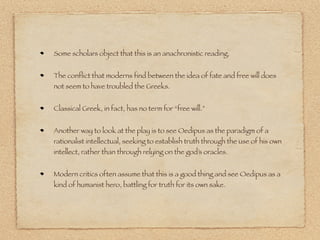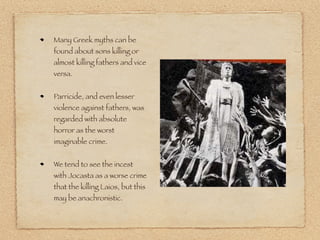This lecture examines the myth of Oedipus and its interpretation. It begins with a summary of Oedipus's story, including his birth, exposure as an infant, rescue and upbringing unaware of his true identity. As a young man, he kills his father Laios and solves the riddle of the Sphinx, unwittingly marrying his mother Jocasta. The lecture then analyzes Freud and Lévi-Strauss's interpretations before considering alternative views of the myth focusing on fate vs free will or as a critique of rationalism and the Sophists. It concludes by discussing difficulties separating the myth from Sophocles' play and suggestions about the original significance of incest being added to underline the horror















